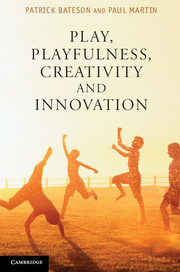Book contents
- Frontmatter
- Contents
- Advance praise
- Preface
- Acknowledgements
- 1 Introduction
- 2 The biology of play
- 3 The functions of play
- 4 Evolution and play
- 5 Creativity in humans
- 6 Animals finding novel solutions
- 7 People and organisations
- 8 Childhood play and creativity
- 9 Humour and playfulness
- 10 Dreams, drugs and creativity
- 11 Pulling the threads together
- Notes
- References
- Index
5 - Creativity in humans
Published online by Cambridge University Press: 05 July 2013
- Frontmatter
- Contents
- Advance praise
- Preface
- Acknowledgements
- 1 Introduction
- 2 The biology of play
- 3 The functions of play
- 4 Evolution and play
- 5 Creativity in humans
- 6 Animals finding novel solutions
- 7 People and organisations
- 8 Childhood play and creativity
- 9 Humour and playfulness
- 10 Dreams, drugs and creativity
- 11 Pulling the threads together
- Notes
- References
- Index
Summary
Creativity can be defined in different ways. We use ‘creativity’ here in the sense of generating novel actions or ideas, particularly by recombining existing actions, ideas or thoughts in new ways or applying them in new situations. In our view, it is preferable to consider separately, under the heading of ‘innovation’, the question of whether those new behaviour patterns or ideas are practically useful and widely adopted by others. For our purposes, creativity is simply about generating novelty and it is a precursor to innovation.
Measures of human creativity have been strongly influenced by J. P. Guilford’s (1956) distinction between two styles of thought, which he described as diverging and converging. The diverging individual is more open to new ideas and the converging individual is more critical and analytical. The differences between the two cognitive styles are measured by what is called the Alternate Uses Task. When asked what can be done with, say, a brick, the convergent thinker says it is used for building a wall. The divergent thinker suggests many different uses, such as a doorstop, a hammer, breaking windows, repelling an attacker, grinding up to make red paste, and so forth. Scoring highly on psychological measures of divergent thinking is sometimes regarded as though it were synonymous with being highly creative, but it is of course just one measure of one aspect of human creativity.
- Type
- Chapter
- Information
- Play, Playfulness, Creativity and Innovation , pp. 55 - 68Publisher: Cambridge University PressPrint publication year: 2013



